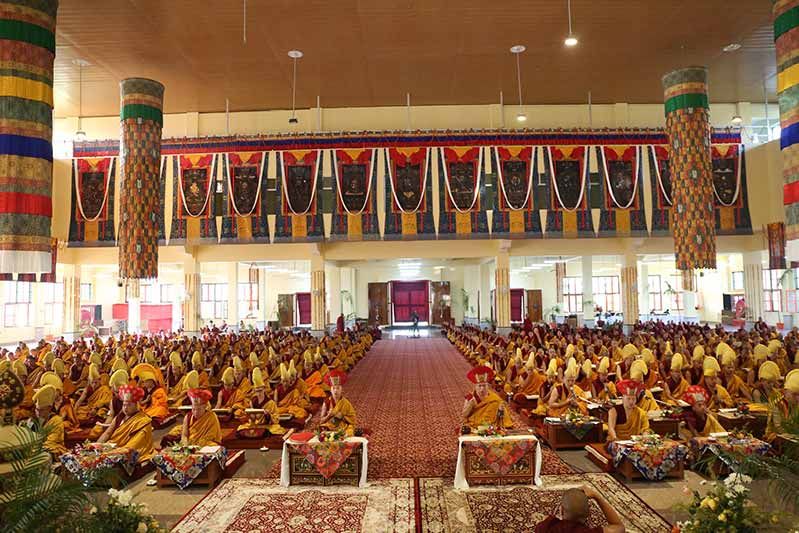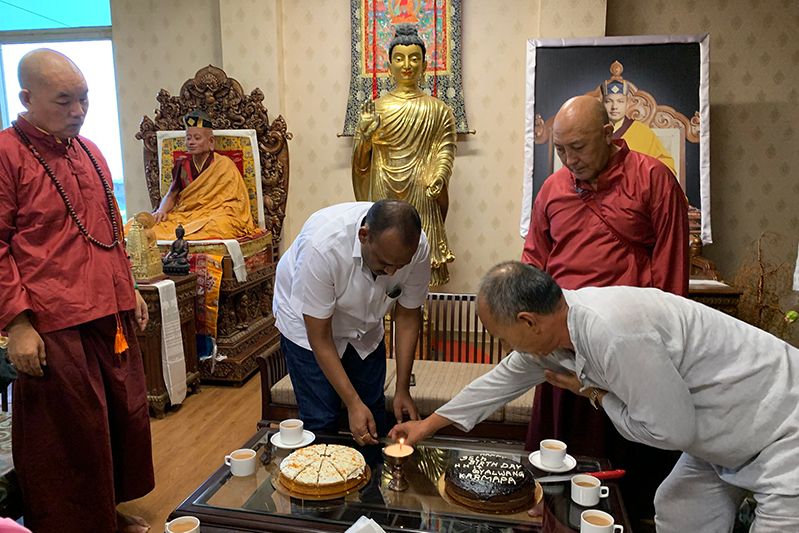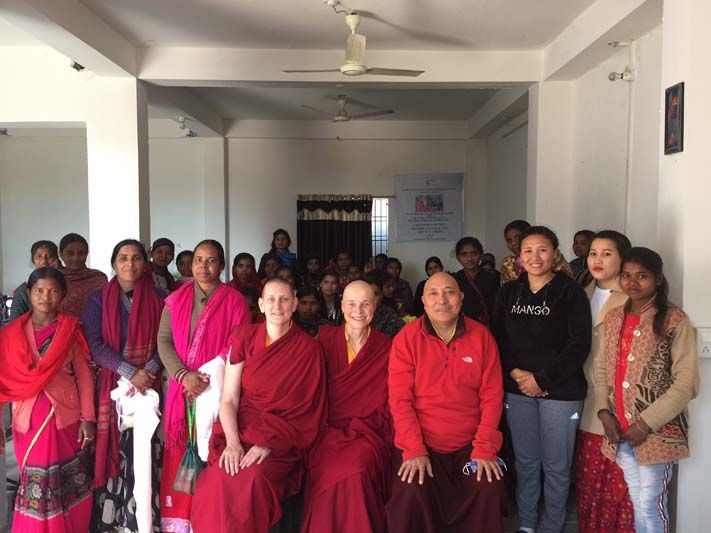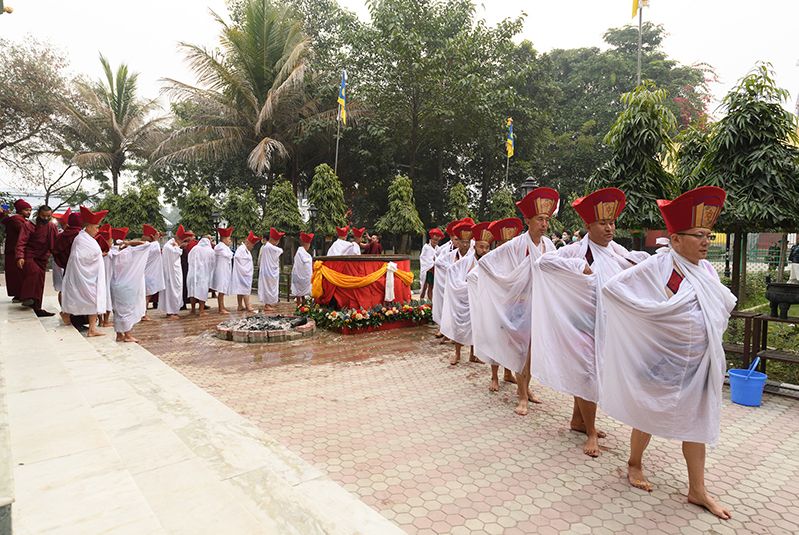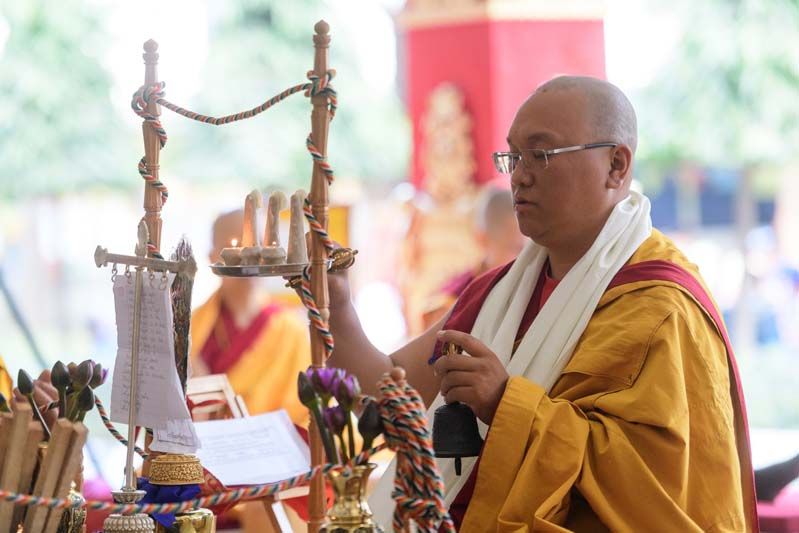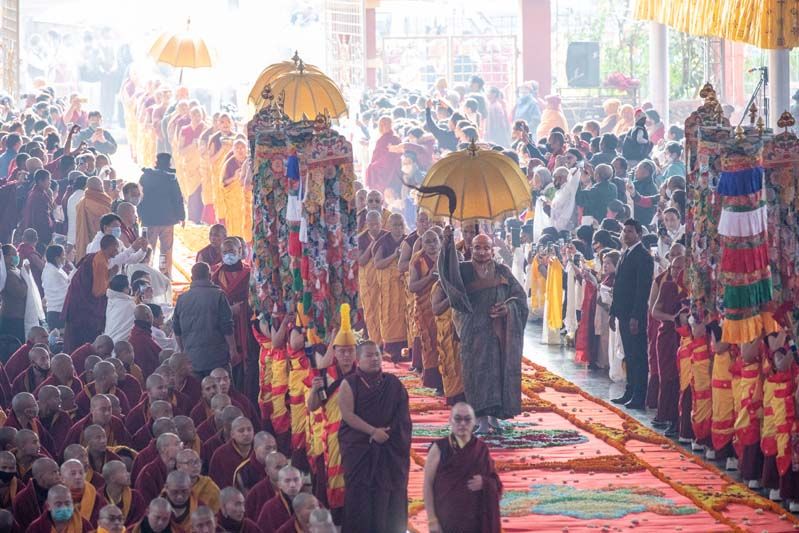Yongey Mingyur Rinpoche on the Four Foundations of Mindfulness Session 3: Resting in Awareness without Distraction is Mindfulness of Mind
- January 28, 2020
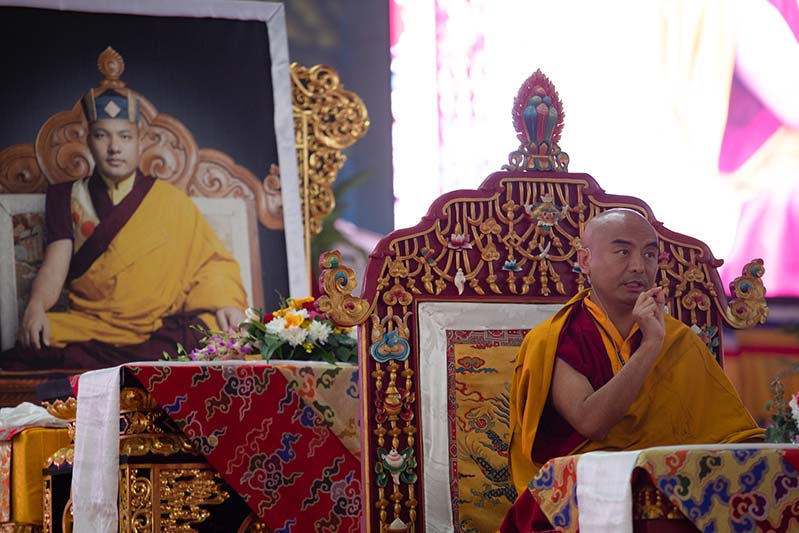
The Pavilion, Bodh Gaya, India
January 28, 2020
Mingyur Rinpoche opened the afternoon session of this first day of pre-Monlam teachings by asking the participants whether they had carried the morning teachings on the Four Foundations of Mindfulness, particularly Mindfulness of Mind, with them over the lunch break. He reminded us about the view, meditation, and conduct: the view being our instructions and understanding, the meditation being our effort to practice the instructions, and the conduct being mindfully carrying the practice into daily life, remembering it during eating, walking, and so forth. Repeating the question that had ended the morning sessions, he asked, If the essence of the mind is awareness, and if awareness is with us all the time, even if we sleep or fall unconscious, are we always meditating or not? All quickly agreed that we are not always in meditation; Rinpoche commented that if we were, we’d already be buddhas and there would be no need to attend the teachings. But why aren’t we meditating, if we have awareness — the mind that knows, that is lucid and clear? He called for a five minute discussion on this question, and a lively hubbub ensued, followed by several responses from brave members of the sangha. Answers included that our awareness can be clouded by the mind poisons, that we lack recognition of mind’s nature just as we lack recognition of our innate Buddha nature, that we get distracted and cannot stay with our awareness for long, that we need to guard our awareness with better mindfulness like a shepherd watching his sheep in the mountains, and that we have too many self-created concepts crowding our minds to see awareness for what it is.
Rinpoche commented,”You all spoke well.” He continued, “The main thing is, we don’t recognize that knowing. The clear awareness is there, but we don’t recognize the clear awareness as being clear awareness, and for that reason it doesn’t become the Foundation of Mindfulness of Mind. So during meditation we recognize it — we recognize its nature. Within meditation we need to sustain that recognition.” Rinpoche had mentioned in the morning session that when the Foundation of Mindfulness of Mind is properly practiced, the result is prajna, the wisdom that dispels ignorance. He now pointed out that as we train in progressively stronger meditation, the true nature of the object (mind) becomes clearer and clearer as our mind becomes more pliable and workable.
Rinpoche held up his watch and asked, “What is this for?” He explained that if one didn’t know a watch is for telling the time, one might mistakenly take it for a bracelet, and then even the most accurate watch in the world would be of no use. He gave another example from the Sublime Continuum by Maitreya, regarding a poor couple living in a partially destroyed hut. Eventually they sold their land and when the new owner removed some soil to build a foundation, a vast treasure of jewels was discovered. The poor couple could have been really rich, had they only known what lay under their hovel. But without that recognition, they were doomed to a life of continual poverty. “Similarly,” he added, “we all have the innate qualities within us, but we don’t recognize them. We accumulate karma and afflictions that hide our own nature. So meditation is important. If we can sustain it, it is the perfection of the Foundation of Mindfulness of Mind.”
Rinpoche added that anything can be a focus of meditation, and there is no need to get rid of thoughts or anything else — but one must sustain one’s recognition. Knowing that thoughts arising in the mind is not a defect can make meditation much more accessible. Trying to block thoughts only increases our difficulties; allowing an unblocked flow in the mind leads to peace within ourselves.
Then Rinpoche gave a quiz. He noted, “This one’s easy. There are 3 options, and every answer is a pass!” He asked us to raise our hands in turn: first, those who have recognized their awareness, then those who have not, and finally, those who aren’t sure. How is it that everyone who answered was correct — even those who haven’t recognized their awareness? He explained, “If you recognize that you have not recognized, then you have awareness. That’s awareness right there.” He continued, “Awareness is just mind — they’re the same. It’s just knowing. You experience, and there’s nowhere to go outside that.” He then quoted from a pivotal stanza from the Aspiration of the Mahamudra of Definitive Meaning by the 3rd Karmapa, Rangjung Dorje:
Arisen, it’s mind; stopped, it’s also mind.
May we sever all misconceptions in the mind.
He added, “Everything in samsara and nirvana, the mind knows it. If the mind can apprehend something, it is an object of mind.”
Rinpoche gave two traditional, and beautiful, analogies for the mind. First, he described the mind as an ocean, full of the waves of thoughts and emotions. Then he explained that the mind is like space, and that dualistic concepts, feelings, and other mental events are like the clouds, rainbows, dust storms, thunder, lightning, and torrential rains that can erupt within it — but which nonetheless do not tarnish or change the nature of space itself. All these phenomena arise from the sky and dissolve back into it, as Milarepa said. “In the same way, the mind knows and is aware. All these things, they arise from us, they stay in us and they dissolve back into us. And so that knower, we need to recognize it. Meditation is just making a habit, recognizing and getting used to the qualities and nature of the mind.” Resting in that awareness without distraction is Mindfulness of Mind.
Rinpoche said that in other Buddhist traditions, particularly the Theravadin tradition, greater emphasis is placed on the other Foundations of Mindfulness, especially Mindfulness of Body and Mindfulness of Feelings. But the Tibetans focus on looking at the mind’s qualities, because that leads directly to insight. For example, one of the mind’s qualities is constant change. He reminded us of our practice of watching the breath from the morning session. The character of the breath changes in every instant. If we know that moment-to-moment change, we just look at it. We don’t need to do anything to it: “This is the meditation on impermanence.” Rinpoche begged our pardon while reminding us that we are all getting older, moment to moment— along with everything else in the universe: “It’s not just from last year to this year; we’re getting older from today until tomorrow. From the morning until now, we’ve grown older. We’re getting closer and closer to death.” Aeons change, moment to moment. “Time doesn’t stand still for even a second. It’s always changing.”
A lively foray into logic ensued, as Rinpoche broke down our concepts of time, exposing the underlying fallacy. He started by holding up a flower and saying that only this year’s flower is here now — last year’s flower is long dead, and next year’s flower hasn’t come. But he asked, “Among the three, which do we have? Do we have this year or not? We have this year, right? Raise your hand if you think we’re in this year.” Actually, he continued, the term”this year” is problematic for describing the present moment, because it takes 12 months to make a year and we are only in January, with 11 months still to come. “But in our thoughts, if you don’t examine it, ‘this year’ appears. The other 11 months don’t exist, but we grasp at them and make ‘this year’ a thing.” Rinpoche gave the analogy of seeing a cluster of birds flying in the sky: it looks like a line in the sky, until you examine your assumption. He asked for a show of hands by those who thought we were in “this month” and pursued a similar line of reasoning: it takes 31 days to make up the month of January, but “27 are gone, it’s the 28th today. The next few days haven’t arisen, so they don’t exist. So what do we have now, the 28th? Is it the 28th now, or not? Raise your hand if you think it’s the 28th?” He added wryly, “Only two people raised their hand — they must think it’s a joke.” Indeed, Rinpoche continued, “You need 24 hours in a day. But now we only have 2:00pm. Is it 2:00pm? Raise your hand if you think so? … No one dared!” He added that in an hour there are 60 minutes, but it was 2:48pm, with 47 minutes gone and 12 still to come. He continued, “You need 60 seconds for each minute, but every moment, they change. So you can’t grab those seconds. How many parts in a second?” He described a nail piercing 64 sheets of paper — how long would it take for the front of the nail to go through each sheet of paper in turn? Rinpoche here noted another link to Theravadin tradition, which talks of the “indivisible instant.” This series of queries refreshed everyone’s energy, pointed out impermanence and the nature of time, reminded us of the way our minds fabricate and construct inaccurate explanations of reality, and underscored the importance of recognizing awareness.
Returning to the theme of the breath, Rinpoche summarized, “So there is the absolute truth, and relative truth. Every moment, the breath is changing.” He ended the session by directing the assembly to meditate on the breath, noticing how it flowed within the body and changed in every moment. Then he thanked us for our attention and asked us to dedicate the merit to all sentient beings.
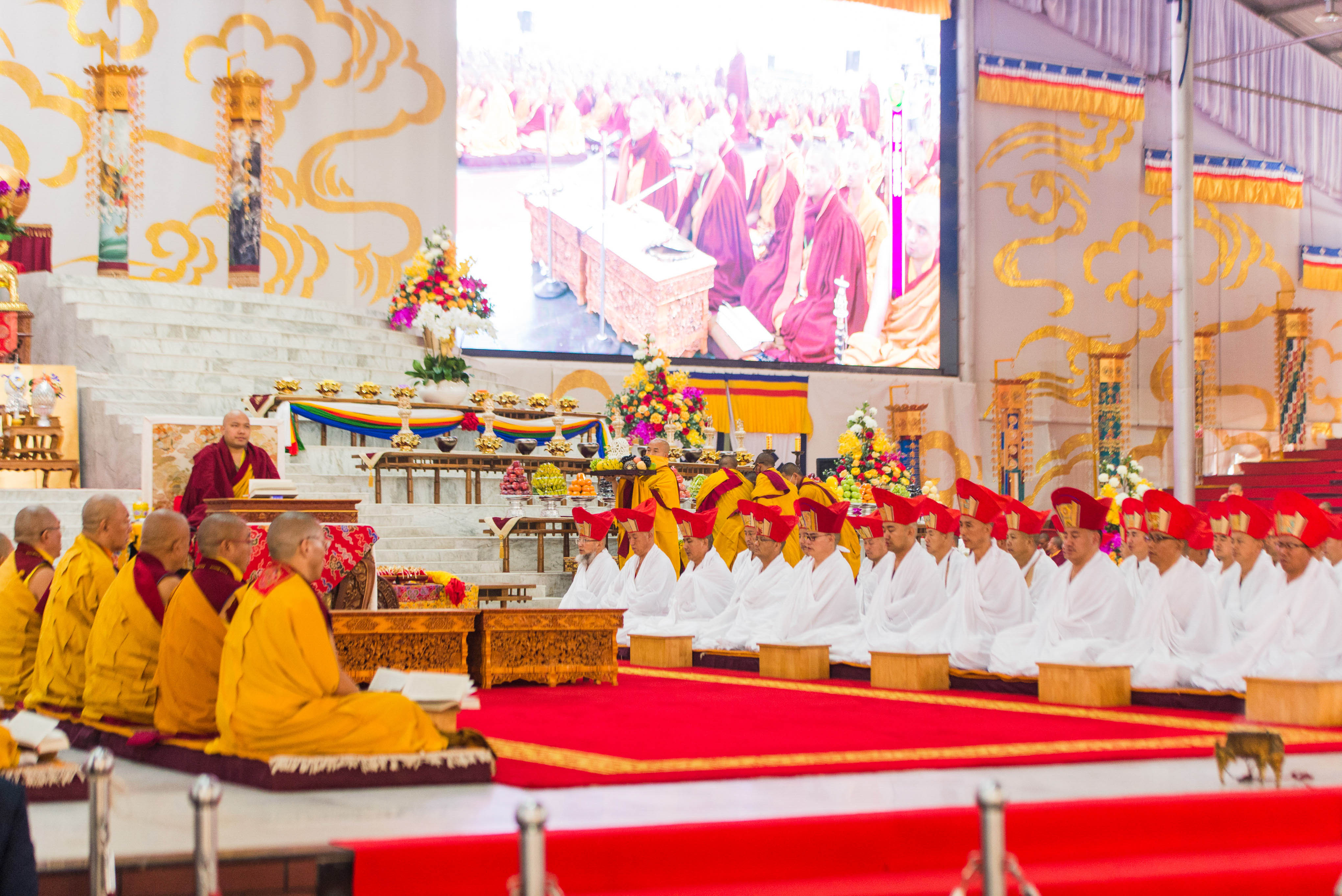
37th Kagyu Monlam Schedule
Tibetan / English / Chinese • French • German • Indonesian • Korean • Polish • Russian • Spanish • Vietnamese
Dharma Teachings
 Meditation Instructions
Meditation Instructions
Recorded during the 37th Kagyu Monlam, Bodhgaya, India. January 28-30, 2020.

